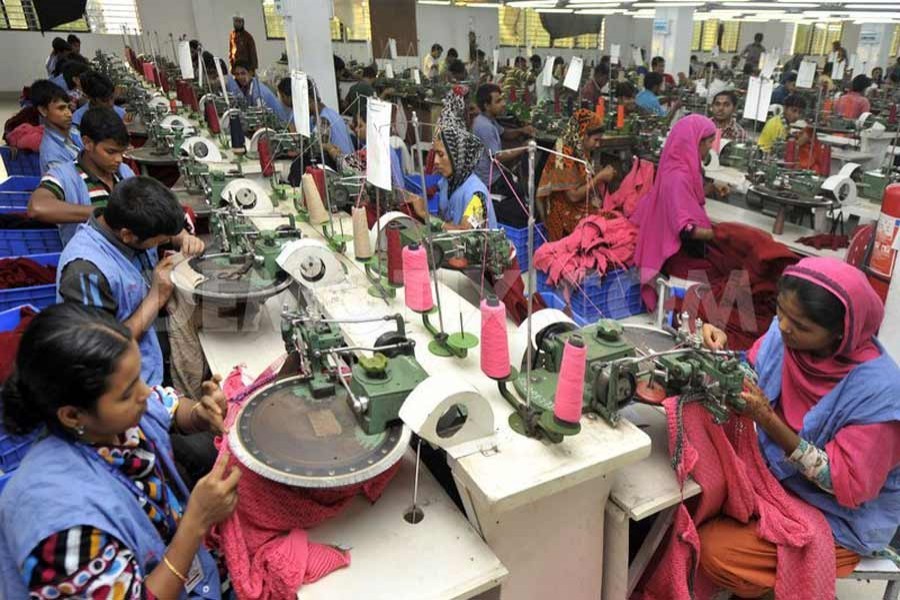Conventionally, the Western world has been highly regarded for upholding democratic values and for being at the forefront of labour and human rights movement. Nevertheless, on certain occasions, they have earned a great deal of criticism where the condemnation often hinges on the notion that the concept of human rights, having originated in the West, reflects Western interests, and allegedly serves as a new type of imperialism or armament of cultural hegemony.
At the moment, when the pandemic-hit readymade garments (RMG) sector of Bangladesh has its back against the wall, some factories are reportedly opting to lay-off their workers. It should now be seen, to what extent, the West is going to participate in these times of adversity and thus in the struggle for the livelihood of some four million garment workers - grappling with the repercussions of the virus outbreak.
Over the past seven years, following the Rana Plaza tragedy, Western activists have manifested deep concern over workers' rights and safety, particularly, in the context of Bangladesh's RMG workers. Western retailers and apparel brands began a major drive to improve workers' rights through strict monitoring and collaboration with institutions and organisations committed to ensuring labour welfare and establishing safer workplaces. As a result, failure of compliance with their rules and regulations led to the termination of business contracts and in extreme cases complete shutdown of factories, thus prompting local manufacturers to maintain safe working practices and uphold workers' rights.
However, the current pandemic brought forth contradictory responses from the same Western retail and apparel brands, who are deemed to champion workers' rights. Large number of order cancellations and hold instructions were some of the initial reactions of the major Western brands. Renowned fashion retailers have invoked the force majeure clause to defend their decisions of turning down completed orders, refusing to bear the bare minimum cost of of raw materials and labour. Cases have also been reported, where the foreign buyers have stopped responding to manufacturers' appeals. While a few have offered discounts beyond the pale (as high as 50 per cent), on the goods made ready for shipment.
As reported by the president of Bangladesh Garment Manufacturers and Exporters Association (BGMEA), order cancellations have already amounted to $3.7 billion, reported by 1140 factories, which will directly impact the livelihoods of some 2.2 million workers (Washington Post, April 19, 2020).
Thanks to some of the zealous industry insiders and leaders of BGMEA who are relentlessly appealing to both national and international platforms to stand for these four million workers. As a result of their constant efforts, a recent study (COVID-19 Tracker: Which brands are acting responsibly towards suppliers and workers) by Workers Rights Consortium revealed, some brands like H&M, Inditex, Kiabi and a few others have committed to pay in full for the orders completed and those under production. However, many major brands still have not come forward and remained adamant to their initial decisions of order cancellation, as the industry and its workers are left in the lurch.
Due to the cancellation and suspension of export orders, salary disbursement will become an impossibility. As a result of aggressive global competition, the industry that is already left with thin margins and now conjoined with the current reactions of Western brands, will eventually head for a major breakdown - drastically affecting some hundreds of small and medium-sized units.
It is now high time that all the Western counterparts uphold the values of workers' welfare, as they regard themselves to be the 'defender of workers' rights' and follow the footsteps of brands who have come forward to stick to their commitments. While all the Western apparel brands are recognised to advocate responsible sourcing, the livelihood of RMG workers should be a fundamental priority, and it is time for them to be true to their responsibilities in this connection.
These four million workers of the RMG industry who are at the lowest rung of the global supply chain are, beyond doubt, a formidable part of the trillion-dollar global apparel market. Many of the major Western retail brands have diverse sources of finance. Besides, they have the opportunity of bailout, as their governments have the capacity to dole out trillions in the form of stimulus and/or grant packages. On the other hand, all these workers simply seek continuity of their lobs, and not any grant or financial aid.
Sifat I. Ishty is Senior Lecturer, Dept. of Economics and Social Sciences, Brac University, Dhaka


